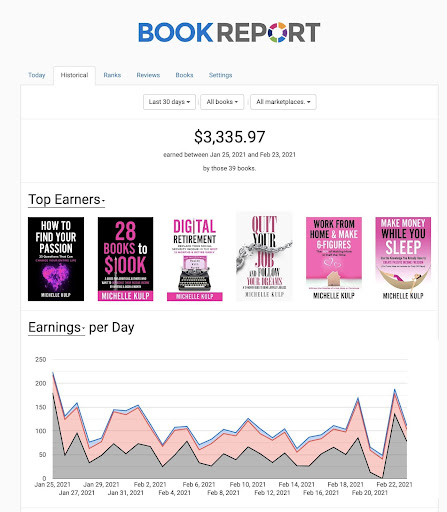
02 Sep Get Paid to Write Short Books
Write Short books and get paid in 30 to 90 days.
Seth Godin, multiple bestselling author once said: “One of my books took more than a year to write, ten hours a day. Another took three weeks. Both sell for the same price. The quicker one outsold the other 20 to 1. A $200 bottle of wine costs almost exactly as much to make as a $35 bottle of wine. The cost of something is largely irrelevant, people are paying attention to its value. Your customers don’t care what it took for you to make something. They care about what it does for them.”
Many of my clients spend years writing their book(s) and I like to call that “slow money”.
What if you could write one short book a month and earn an average of $277 per book like I did? I am going to outline exactly how I help my clients and myself write short books t0 make money.
In the past, big publishing houses could charge more for longer books. There was also a high demand from consumers who wanted to read longer books.
However, times have changed, and people now have less time and decreased attention spans.
Readers want short books!
Top 10 Reasons To Write Short Reads Books
- Time and attention are in short supply, so there is a greater demand from readers for quick reads.
- Writing short books focused on one topic is easier than writing a long book with multiple topics.
- Fewer words require less time to write (it took me three days to write the bulk of this book.)
- Volume boosts your visibility (especially on Amazon). You can attract repeat readers who will follow you.
- Short books involve less risk. Because you are not investing a considerable amount of time or money in creating these books, less than expected sales will not greatly impact you. In fact, you will learn what works and what doesn’t work and then use that knowledge when writing additional books.
- You can create a series of short books that explore your favorite subjects in greater depth than you could do in a single, larger book.
- Much of the data shows that people do not finish reading books. Since shorter books
require less time to read, there is a greater chance people will actually read your entire book. - Amazon has a specific category for these books called “Short Reads.” You can’t select this category when publishing on KDP, but if the number of pages in your book matches the criteria in that Short Reads category, Amazon will include your book in that category giving it more exposure.
- You can set a lower price for your eBook and get a higher quantity of sales.
- You can choose a niche and grow rich by writing short books in very narrow categories and do extremely well.
I love writing shorter books!
In 2020, I decided to write one short book a month as an experiment, and in 12 months I created $3,300+ per month in passive income.

One of the books I wrote during that time was “How to Find Your Passion: 23 Questions that Can Change Your Entire Life” which took me about three weeks. I published it within 30 days, and it has been one of my top income generating books. I believe it’s because people want shorter books with action items they can use to get quick results.
Of course, some books will do better than others. You never know what topic will appeal best to readers. The market decides what they like and don’t like. All you can do is write the best book possible, do your research, launch like a pro, and then move on to the next one.
We live in a high-tech, fast-paced world. Most of us are extremely distracted and our time is fragmented. Gone are the days when people buy a manifesto type book and block out their entire weekend to leisurely read.
These days, our time is broken up into short and often disjointed periods. We face constant interruptions from emails, texts, phone calls, Facebook, Twitter, Instagram, and more.
Consequently, attention spans have diminished. The desire to learn new things still exists but most people want to learn faster.
Consider this when writing books. Instead of writing a book on the A-Z of Marketing, write a series of short books that each focus on one narrow topic. For example, the series could include books on these topics:
- Writing Persuasive Sales copy
- Creating Facebook Ads
- Building a Profitable Blog
- How to Create a Webinar
- Think micro-topics instead of macro-topics.
TIP: Think micro-topics instead of macro-topics
8 Types of Easy-to-Write Short Books
- List or tip book in your niche (example “50 Fitness Tips You Wish You Knew” by Derek Doepker)
- Positive Affirmations in your niche (example, 500 Affirmations for Wealth and Success by Taylor Andrews is 37 pages)
- Step-by-step guide (example, 3 Steps to $10,000 a Month in Instant Passive Income Streams by J.P. Clarke is 63 pages)
- Inspiring Quotes book (example, Thomas Sowell Quotes by Diana is 37 pages)
- 7 Secrets in your niche (example, The 7 Secrets to Becoming a Wealthy Contractor by Brian Kaskavalciyan is 64 pages)
- Collection book such as top strategies, top recipes, or top performers in an industry (example 50 Top Paleo Recipes by Emma Green is 60 pages)
- Low content books like planners and journals (example, The Miracle Morning Companion Planner by Hal Elrod is 23 pages)
- Check out my other blog post, How to Write a Book in Seven Days to learn even more
You don't need to waste months or years getting your books done.

